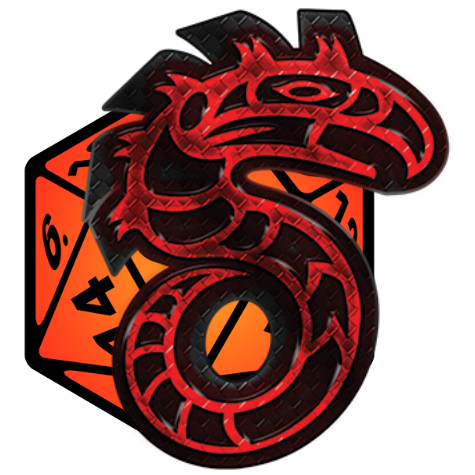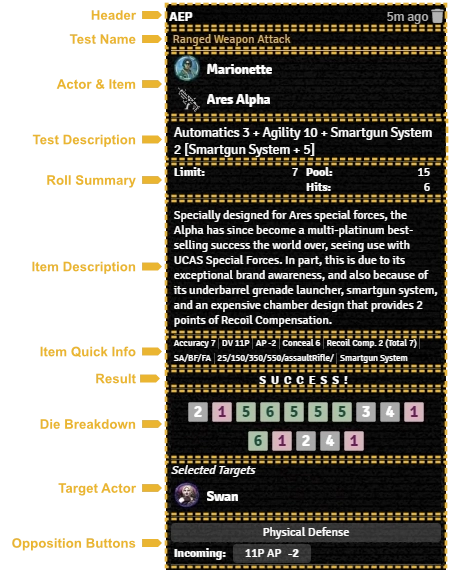Mr. Johnson (talk | contribs) No edit summary |
Mr. Johnson (talk | contribs) No edit summary |
||
| Line 4: | Line 4: | ||
{{Imagebox|sr5-work-weapon-range-rollcard-expanded.webp|Expanded Rollcard|f=11.315|s=0.17.1|float=right|width=450px}} | {{Imagebox|sr5-work-weapon-range-rollcard-expanded.webp|Expanded Rollcard|f=11.315|s=0.17.1|float=right|width=450px}} | ||
==Layout== | ==Layout== | ||
* The {{Anchor|Header}} indicates which user made the roll, and how long ago the roll was made. A user with Game Master (or Assistant GM) {{Foundry|User|Permissions}} will also have a {{#fas:trash}} button to delete the Roll Card. | All roll cards follow the same basic layout: | ||
* The {{Anchor|Header}} indicates which user made the roll, and how long ago the roll was made. A user with Game Master (or Assistant GM) {{Foundry|User|Permissions}} will also have <span style="white-space: nowrap;">a {{#fas:trash}} button</span> to delete the Roll Card. | |||
The | * The {{Anchor|Test Name}} appears next in yellow. It shows what type of roll was made, either a generic "Success Test" or something more specific, like part of one of the specific {{Category|Workflow}}s. | ||
* The third section shows the {{Anchor|Actor}} and potentially {{Anchor|Item}} involved in the test. | |||
The | ** Clicking the Token image will select the corresponding Token if it exists on the currently viewed Scene. | ||
* Clicking on the | ** Clicking on either name will open the corresponding Sheet. | ||
* The {{Anchor|Test Description}} follows the regular SR5 format, showing the Attribute, Skill, and Modifiers involved, followed by the Limit in brackets. | |||
* The {{Anchor|Roll Summary}} consolidates the above information along side the number of hits rolled. Clicking anywhere in this area reveals the {{Anchor|Item Description}} and {{Anchor|Item Quick Info}} when available. | |||
* {{Anchor|Results}} are shown next with a single word or short phrase indicating Success, Failure, or Glitches. Clicking this area shows the {{Anchor|Die Breakdown}} — 1s are highlighted in red, while hits (5s and 6s) are highlighted in green. | |||
* If the roll was performed with a {{Anchor|Target Actor}} it appears here. As above, clicking the Token image will select the corresponding Token if it exists on the currently viewed Scene and clicking the name will open the cooresponding Sheet. | |||
* If the Test leads to further activity, {{Anchor|Opposition Buttons}} will appear at the bottom. | |||
==Context Menu== | ==Context Menu== | ||
{{Imagebox|sr5-context-rollcard.webp|Roll Card Context Menu|f=11.315|s=0.18.3|float=none|width=200px}} | {{Imagebox|sr5-context-rollcard.webp|Roll Card Context Menu|f=11.315|s=0.18.3|float=none|width=200px}} | ||
{{References}} | {{References}} | ||
Revision as of 21:04, 3 January 2024
Needs Improvement
This page is incomplete.
This article was last edited Wednesday, January 3, 2024 by Mr. Johnson.
The vast majority of Actions in the SR5 system, whether from Action Items or similar functionality built into more specific Item Types result in the creation of a Roll Card in Foundry's Chat Log. These Roll Cards have a similar presentation and a set of standard behaviors. Some Roll Cards, like those for ad hoc rolls[git 1] may have fewer elements, while others may have additional specialized content.
Layout
All roll cards follow the same basic layout:
- The Header indicates which user made the roll, and how long ago the roll was made. A user with Game Master (or Assistant GM) Permissions will also have a button to delete the Roll Card.
- The Test Name appears next in yellow. It shows what type of roll was made, either a generic "Success Test" or something more specific, like part of one of the specific Workflows.
- The third section shows the Actor and potentially Item involved in the test.
- Clicking the Token image will select the corresponding Token if it exists on the currently viewed Scene.
- Clicking on either name will open the corresponding Sheet.
- The Test Description follows the regular SR5 format, showing the Attribute, Skill, and Modifiers involved, followed by the Limit in brackets.
- The Roll Summary consolidates the above information along side the number of hits rolled. Clicking anywhere in this area reveals the Item Description and Item Quick Info when available.
- Results are shown next with a single word or short phrase indicating Success, Failure, or Glitches. Clicking this area shows the Die Breakdown — 1s are highlighted in red, while hits (5s and 6s) are highlighted in green.
- If the roll was performed with a Target Actor it appears here. As above, clicking the Token image will select the corresponding Token if it exists on the currently viewed Scene and clicking the name will open the cooresponding Sheet.
- If the Test leads to further activity, Opposition Buttons will appear at the bottom.



